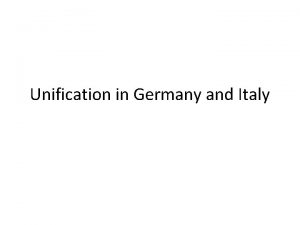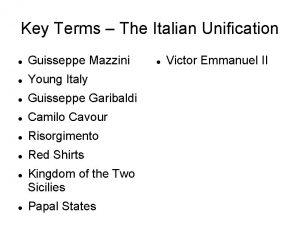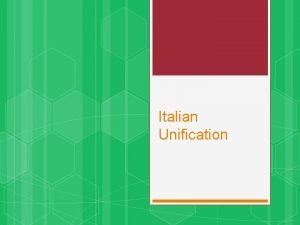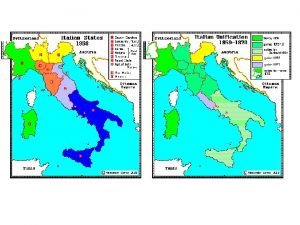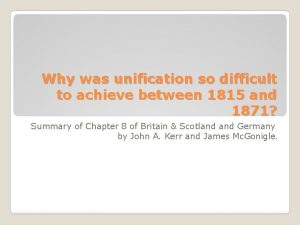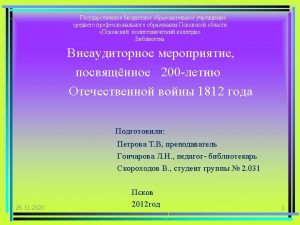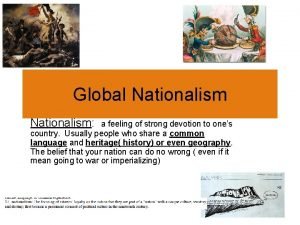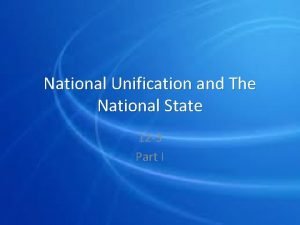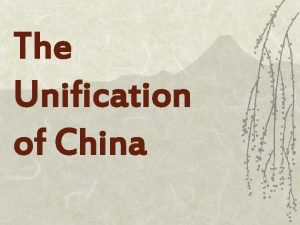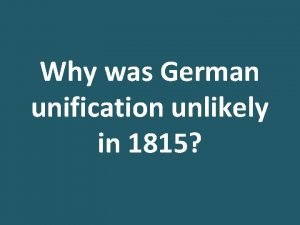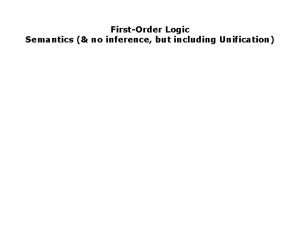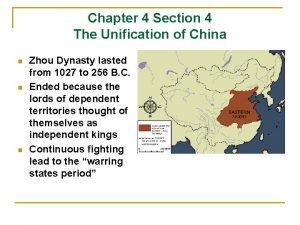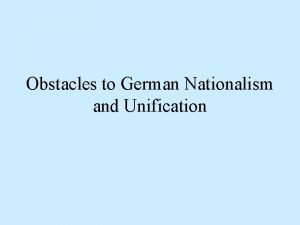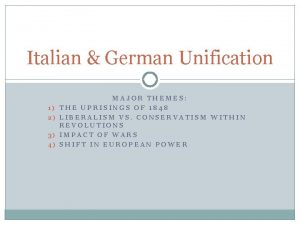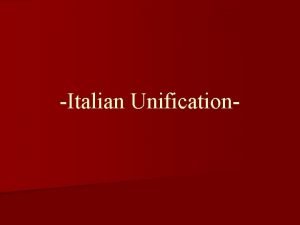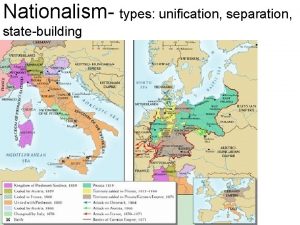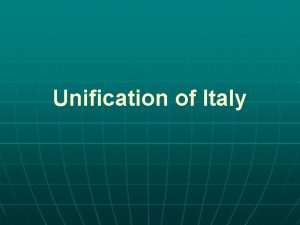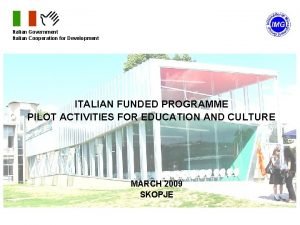Italian Unification VIDEO The Italian Unification or Italian





























- Slides: 29

Italian Unification VIDEO

The Italian Unification or Italian Risorgimento is known as the chain of political and military events that produced a united Italian peninsula under the Kingdom of Italy in 1861.

Five Stages Pre-Revolutionary Cavour’s Policy and the Role of Piedmont Garibaldi’s Campaign in Southern Italy Creation of the Italian Kingdom

Pre-Revolutionary Phase After the Napoleonic Wars and Napoleon Bonaparte’s second defeat, the major powers that has resisted met at a conference called the Congress of Vienna in 1815 Agenda: limit France’s Power, balance of power (no nation too strong), divide up territory conquered by Napoleon The topic of discussion was to limit France’s power, set limits on nations so no one nation became too strong, and divide up the territory conquered up by Napoleon.

Italian Peninsula returned to Austria, which controlled many of the Italian states Few independent states – Kingdom of Sardinia, which controlled Piedmont, Savoy, Nice and Genoa In its negotiations, the congress returned domination of the Italian Peninsula to Austria now occupied Lombardy and Venice and had considerable influence on other Italian states. One of the few places of independence was the Kingdom of Sardinia, which now controlled Piedmont, Nice, Savoy and Genoa. .

Some of the things that conflicted and interfered with the unification process were: Austrian control of Lombardy and Venice several independent Italian states the autonomy of the Papal States the limited power and influence of Italian leaders

Revolutionary Phase: During first half of 19 th C, only very educated wanted unification The masses showed no concern.

At first, they only wanted more rights from the government but the cause began to grow By 1820, Carbonari were involved in many failed revolutions against Italian states Austrian Empire crushed all of them However secret societies were formed, including the Carbonari.

By 1820, the Carbonari were involved in numerous failed revolutions against the Kingdom of Two Sicilies, the Kingdom of Sardinia, Bolonga, and other Italian states. However, the Austrian Empire crushed all of these revolutions; thus leading to more resentment from the Italians.

The Soul and spirit of Carbonari was Giuseppe Mazzini He wanted a united Italy with a Republican government He popularized the movement by creating ‘Young Italy’, which spread ideas of unification The 1848 revolutions in Europe, brought some reforms to Italy, but not enough

The revolution also occurred in the Kingdom of Two Sicilies were the king signed a constitution. In the Papal States, radicals took over Rome, causing the Pope to flee. In the absence of the pope, Garibaldi and Mazzini created a republic called the Roman Republic. In Piedmont, after the insistence of nationals, the King Charles Albert was sent to Lombardy in their fight for freedom from Austrian rule.

1848 revolutions crushed 1849, France sent troops to Rome, and destroyed the short lived Roman Republic Piedmont lost to Austria, and the King was forced to abdicate, causing his son Victor Emanuel II to become King in 1849

Unification of Italy seemed far off But, a turning point – Count Cavour was appointed prime minister of Piedmont in 1852 Italy would never be the same

Lesson 2

Who Was Guiseppe Mazzini While at university he began the life of a revolutionary. He started to become affiliated with the Carbonari group, which was instrumental in applying force in certain areas to spark a revolution. However, he was soon forced to flee to France after he was exposed in affiliating with the Carbonari and ended up in France. While in France, Mazzini founded his most influential cause to the Italian revolution, Young Italy. Mazzini actually conducted this group from

Young Italy was a specific group consisting of liberal intellectuals vying for a strong central government after Italian unification. This group amassed 50, 00 to 60, 00 Italian in size, and lasted roughly two decades. Also while abroad, he called for the removal of Austrian influence in Italy, an end to the pope’s temporal power over the Papal States, and the creation of a republican national government.

Mazzini did not return to Italy until April of 1848. Still holding fast to his revolutionary ideas, he supported King Charles Albert of Piedmont-Sardinia against the Austrian monarch. However, this revolution failed, and he relocated to Rome where Mazzini was eventually named as the head of the first republic of Rome. This was short-lived as French troops overran Rome to restore the Pope’s power. Mazzini was once again forced to flee Italy this time landing in Switzerland. His influence in unification was never really the same again.

After his failed attempt of Revolution, Mazzini was reduced to an onlooker than an active role. However, his role in Italian unification was considerable as it appeared in some of the laws passed by the eventual Roman Republic such as : universal manhood suffrage, instituted government control over clerical salaries, and political clubs designed to support the common man. Although he never saw the democratic republic Italy would become in his lifetime, Italy became a unified nation under a institutionalized monarch. At the very least, Mazzini saw his Italians hold a single country to call home.

LESSON 3

Cavour’s Policy and the Role of Piedmont By the use of bargaining, putting great powers against each other, war, and political cunning, Cavour was able to unite Italy in a short time.

Piedmont a small state – but it had considerable influence due to its military strength Also, Victor Emmanuel ruled with parliament, which created stability Cavour wanted a strong state i. e. Piedmont, to lead the unification And Piedmont can only become strong with railroads, economic freedom, stable finances, and a higher standard of living.

Cavour needed an ally – France Got Napoleon III on his side, since they both hated Austria Napoleon wanted a liberated Italy To seal the deal of this partnership, both leaders met secretly at Plombieres, a French spa. Piedmont would stir up trouble in one of the territories controlled by Austria, thus forcing Austria to go to war against Piedmont. France would help Piedmont in exchange for Nice and Savoy.

In April 1859, war broke out between Piedmont and Austria. France and Piedmont did well won battles at Magenta and Solferino Prussian mobilized in defence of Austria Piedmont received Lombardy from Austria as a result of the war. After the war and the political manoeuvring, Piedmont had greatly increased its size. However, Garibaldi’s campaign in southern Italy would more than double the size of the kingdom

LESSON 4

Garibaldi’s Campaign in Southern Italy If Mazzini was the soul of the unification process, then Garibaldi was the hero He recruited soldiers from Genoa to go to Sicily The expedition of soldiers was an instant hit Garibaldi’s red shirts had tremendous success He wanted Rome, but this worried Cavour like a fox, started uprisings in papal states, and sent Piedmonts army to stop it 1860, 2/3 of papal states joined piedmont, and Rome was left alone. Him and his troops marched south Sept 18, Garibaldi gave up command of his army, shook hands with Victor Emmanuel – unity of Kingdom of Italy in 1861

Creation of the Italian Kingdom Although the Kingdom was formed, it did not include all of Italy Rome and Venetia missing Rome under control of France, Venetia was Austria’s 1866, Seven Weeks war with Austria/Prussia Austria promised Venetia if Italy remained neutral, Prussia promised it if they joined Prussia Italy joined Prussia, and they won

In 1870, the Franco-Prussian War occurred between France and Germany and Napoleon III was forced to pull the French troops from Rome to aid the war effort. While Rome and the remaining Papal States remained unprotected, Italian troops marched in unopposed. In October 1870 Rome voted to join the union and in July 1871, it became the capital.

In the end, Cavour, Garibaldi, and Mazzini became the founding fathers of a nation and were immortalized.

 German and italian unification compare and contrast
German and italian unification compare and contrast Obstacles to italian unification
Obstacles to italian unification Unification of italy summary
Unification of italy summary Heart of italian unification
Heart of italian unification Why was italian unification difficult to achieve
Why was italian unification difficult to achieve Video.search.yahoo.com
Video.search.yahoo.com Yahoo.com.yw
Yahoo.com.yw The frame size of a video refers to the video’s
The frame size of a video refers to the video’s Yandex video b****
Yandex video b**** Unification algorithm example
Unification algorithm example Strong devotion
Strong devotion National unification and the national state
National unification and the national state Unification of china
Unification of china Chapter 23 lesson 3 nationalism unification and reform
Chapter 23 lesson 3 nationalism unification and reform Germany before 1871
Germany before 1871 Unification operating model
Unification operating model St an
St an Stages of german unification
Stages of german unification Prolog unification
Prolog unification Sardina
Sardina Gauge coupling unification
Gauge coupling unification Unification in first order logic
Unification in first order logic C section
C section Obstacles to german unification
Obstacles to german unification Germany before unification
Germany before unification Unification of italy class 10
Unification of italy class 10 Germany before unification
Germany before unification Prolog langage
Prolog langage Lời thề hippocrates
Lời thề hippocrates Dot
Dot
